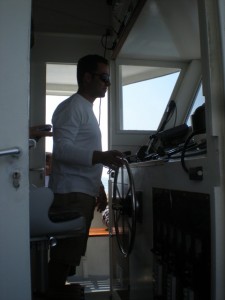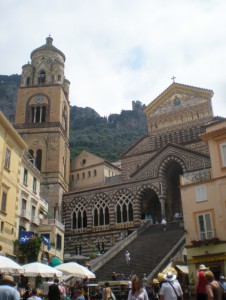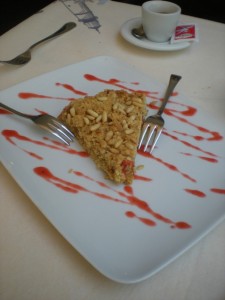Cultural exchange
The Amalfi coast is definitely known as a place to see in Southern Italy. In the months running up to the trip, every time I mentioned that I would be in the south, I got the question, “will you see Amalfi?†or the command, “make sure you go to the Amalfi coast.â€
Like the Cinque Terre, the Amalfi coast is known for its jewel-like villages clinging to the coastline. We decided that the best way for us to experience the towns would be by boat. The boats that serve the cities up and down the coast are great. Varying in size and fanciness, they take travelers the direct route, on the water, from one city to the other.
This was a new form of transportation for us, requiring us to locate the ticket office, dock and slip. A stop by the information office insured we were headed in the right direction.
Once on board, we scoped out the best seats: ground floor, starboard side, toward the front – just opposite the helm. This gave us a good view of the coastline, and the captain, who was very friendly.

I think he liked the Ant. In the way only an Italian captain can look, this guy was both weather beaten and stylish. His face was worn, under his designer sunglasses, and metallic trainers distracted from the flesh-toned medical sock running the length of one leg. He kept leaning out of the cockpit, pointing to the coastline and throwing out the names of the towns.
“Cetara. Positano. Atrani.â€


Along with the towns, their majolica-tiled cathedral domes blending together, we were treated to views of ancient lighthouses, and caves.


Finally, our captain friend leaned out and said, “Amalfi!â€
Amalfi. That was our destination for the day. First on the list: cappuccino.
We hadn’t had much in the way of breakfast, opting instead to catch the early boat. Now we needed to find a pastry shop that we liked the looks of. We walked through the town square, past the cathedral, and into a shop with pizza and baba in the front window.
“Due cappuccino, per favore.â€Â I walked over to the pastry case to see what I could find. “E una di questeâ€Â I pointed to the bready things that looked like popovers.
“Normale?†asked the proprietor, a round man with shaggy white hair.
“Si.â€Â I had no idea what the alternative was, but the cream-covered plates in the case looked a bit over-the-top. Even for me.
He pulled one of the pastries out and put it on a plate. Then he drenched it in some kind of liquid from a stainless steel bottle, and handed it to me.
“Grazie.â€Â I took my prize over to the Ant who was waiting at the bar for the cappu.
“Look at this.â€Â We both stared at it in awe. We didn’t know what we had, but we were appropriately excited.

Baba is a regional pastry that is drenched in rum. Not so much my bag, but it was tasty, nonetheless. With our cappuccino in front of us, we settled in for the caffeination we so desperately needed.
“Buon giorno.â€Â The young man behind the counter was smiling at us, looking up from cleaning the marble slab. He looked curious. “Where are you from?â€
The familiar question was slightly amusing. He’d guessed the language, surely he could guess the country.
“The United States. America.â€
“Si, si. But where?â€Â Ah, he’d already figured it out.
“Idaho, Oregon. The west.â€Â Sometimes people have heard of Oregon, but almost nobody knows Idaho. Even in the US, Idaho, Iowa and Ohio are interchangeable for the vast number of Americans.
“Ah, but you are Italian? You look Italian. I think, you look Italian, but something is not right.â€
“Yes! Our family is Italian.â€Â We’re more than happy to share this information with anyone who shows an interest. It gives a little cred. (I’m sure the “not right†was our shoes.)
“You stay in Amalfi?â€
“No, Salerno.â€
He shook his head. “Next time you stay in Amalfi. This is my town. I show you. You will be here tonight?  You come back, I will be your tour guide. I will show you everything. Right now I have to work, but tonight, you come back. What are your names?â€
He was animated, looking intently from one of us to the other, sincere in his interest to show us his town.
“Kristin.â€
“Leslie.â€
He repeated the names. “Lezley.â€Â He worked it out, the name an unfamiliar one. “Kreesteen.â€Â My name, so close to the Italian equivalent, is almost always converted to Christian. I went by “Kris†a lot the last time I was here. It’s not something I accept very often in the states, but in Italy, it seems to fit.
“I am Nicola.â€
We both repeated. “Neecola.â€
“Kreesteen, you will return tonight?â€Â He was grinning, awkwardly, but determinedly.
“Forse, Nicola. Forse no.â€Â It was possible, though unlikely. I didn’t want this sweet boy to get his hopes up. They were definitely on the rise. Flattering, but hard to have to manage his expectations while we stood there drinking cappuccino. “Torniamo a Salerno.â€Â We would be going back to Salerno.
Done with our coffees, we pushed the cups toward Nicola and smiled.
“Kreesteen, I hope you will return tonight. I will hope to see you.â€Â Apparently his expectations weren’t going to be managed.
“Ciao Nicola. Grazie.â€
We stepped out of the shop into the sunlight and walked back to the cathedral.
“Wow, he liked you,†crooned the Ant.
“Yes, he was very sweet. I hope he’s not too sad when we don’t come back tonight.â€Â I really don’t like making sweet boys sad. It’s usually the sweet ones that unwittingly fall for me, developing puppy-dog crushes and making me squish their hearts a little.
The cathedral was on our list of things to see, so we walked up the zillion stairs to the entrance, noticing the colorful rice bits strewn everywhere, and a hunky guy with a messenger bag.

“Did you see him?â€Â I asked the Ant. “Go back and look. He’s hot.â€Â The Ant is single, and Italian men are fun eye candy. Even for a big-ole lesbian like me. In the states, 90% guys looking like this would be gay. And I love my gays. So, even though I usually make a point of not giving false hope to my family by talking about cute men (I’d once gotten a call from my sister, chastising me for telling my mother that I was going to have my “gay husband’s†baby. “What, exactly ,did you tell Mom?!â€)  it had been fun to point out the extra-yummy ones to the Ant and see if she agreed. She doubled back and took a peek, pretending to take in the building.  This one was a little to smooth for her. So we headed inside.
The art and architecture inside was fine. We saw beautiful, delicate columns, and an over-the-top tomb decorated in marble and gold. Most of it we passed by without much consideration, as our stomachs began to churn. Cappuccino and rum-soaked baba wasn’t really enough to sustain us through much sight-seeing.
Back in the street we considered where to go for lunch. We’d seen pizza, but nothing had really grabbed us.
“We could always go to Nicola’s place.â€Â The Ant was smiling and looking at me out of the corner of her eye.
“Yeah, we could.â€Â I wasn’t up for too much in the way of game-playing. “But let’s not.â€
Amalfi isn’t that big of a town. We walked up the main street, away from the water until it became distinctly un-touristy. Good for a peaceful walk, but not good for food. Back into town we jogged, the hilly street propelling us downward. We dismissed take-out places, in favor of somewhere we could sit, rejected the feel and price of several, and climbed a set of stairs to an interesting prospect, only to find it closed.
“Nicola would like to see you.â€Â I didn’t respond to the statement from the Ant. “You know you’re not going to live that down for a while, right? But it’s only because I love you.â€Â She was nudging me affectionately with her shoulder.
“You love me, so you taunt me?â€Â I answered sharply. The lack of food had pushed me over the edge. “It’s not so fun for me. Here, this place looks good.â€
Finally, we’d found a pizza place that passed muster. We sat in the courtyard, and I breathed a little.
“I’m sorry I snapped. It’s just difficult.â€Â I felt like I owed her an explanation. Like I wanted to give one. “Think what it’s like to have beautiful, kind, sweet boys take an interest in you. To have them flatter you. And then to have to embarrass them, or to break their hearts just a little. Over and over. It’s not so fun.â€
She was looking at me with big eyes, nodding faintly.
“And then imagine what it’s like to be me, knowing that, every time a guy hits on me, whether it’s Nicola, or a gas station attendant, that my family wishes I’d accept. That they wish I would say yes.â€
Both of us were tearing up now.
“It’s hard. And it makes me unwilling to do things like point out hot guys.â€
We paused to order lunch, both of us breathing deeply, knowing the conversation was a good one. A hard one.
We talked about the day, years ago, when I had come out to the Ant, the concerns she’d had, and the great journey of acceptance she’d traveled (she loves the gay men almost as much as I do).
Our pizza arrived, and we were more than a little happy.


The food was beautiful and really good. We were so hungry that we even ordered dessert. A gorgeous pine nut torta with strawberry sauce.

The rest of our day was filled with a tour of the paper factory, given by another sweet boy named , Rafael, and a hike to the nearby town of Atrani.


The Ant and I were gentle with each other. I didn’t snap again, and she didn’t mention Nicola. We simply walked together through the sweltering day, shared a giant bottle of water, and went home to make dinner.
We didn’t talk about boys again until the next day, when we were walking to the bus station.
“So, I’m thinking,†the Ant started, a look of determination on her face, “that in this journey of acceptance I’m taking,â€Â I looked at her, interested to hear the rest, “that it would be good for you to tell me when you see someone who is cute.â€Â  Okay, I could do that. “Like you could say, ‘she’s really attractive’ so that I could get an idea of what type you like.â€
Oh! She wanted to know what type of women I liked! Wow.
“I mean, maybe don’t go on and on about it, but…†she was a little flustered, her brow furrowed and her hands extended.
“No, I won’t talk about how I want to slap her ass or anything, but sure. That would be fun. Kind of like a cultural exchange.â€
We looked at each other and laughed. It wasn’t enough that we were traveling through Italy. This would be our cultural experience: eyebrows lifted toward hot women, and fingers covertly pointed at yummy guys. And not another mention of Nicola.
June 22, 2010 3 Comments
I know that you are a voracious reader. But….doesn’t it get old to be constantly reading about heterosexual love in 99% of all the fiction out there? I know I read the occasional gay love scene with detached fascination, and realized that it must be the same for you, only in EVERY book.
Well spotted, Heather.
The short answer: Yes, it gets old. More than that, the lack of authentic GLBT stories in literature, movies, television and pop culture generally make it really difficult for GLBT people to identify with the images of our community. The vacuum of positive images and role models can make us cling to the caricatures and clichés presented as our lives.
And that can be very defeating when, as a teenager, you are told that you will either be a spinster, a bull-dyke, or die a hideous death.
The long answer:
Earlier this week, a friend of mine posted about a piece of lesbian fiction that will be coming out this month. In it, she referred back to a book called, “Sweat,†one of the author’s earlier works. It was like reading about an old friend. I flashed back to high school when my girlfriend and I would pull the book out from under my bed and read it hungrily, finding in it a sense of belonging. A sense of understanding that we weren’t alone. That we weren’t freaks.  That there were others like us:  softball players who liked girls.
There were also the tattered copies of Rita May Brown novels, and Martina Navratilova biographies. Books that were legitimate enough to buy at second-hand book stores without completely freaking out the people I was shopping with.
I live in Portland now, where I can get my hands on any kind of lesbian-centered literature, history, or humor I want. But it’s still not mainstream. I have to look for it. Like a book on Malaysian cooking. It’s there, but it’s not something I run across. It’s rare that I pick up a book from the bestseller rack and find that there’s a lesbian sub-plot. (Who am I kidding, it’s rare that I pick up a book from the bestseller rack at all.)
And it’s not just in books that this is the case. In movies, and in television; in any part of pop culture, the existence of a homo plot is out-of-the ordinary. It’s something to comment on. Take a look at the reaction to “Brokeback Mountainâ€. From protests, to discussions of whether the roles would ruin the careers of the actors who took them, the movie was totally controversial, even though it had more nominations than any other movie at the academy awards that year. Had it been a movie about a heterosexual relationship, it would have been no big deal. But it was out-of -the-ordinary, because it was two men.
In the rare instances where gay sub-plots appear, I find myself, and a lot of other queer folks, clinging to them like lifelines. Take ER. I didn’t watch ER. Until Kerry and Lopez got together. It was tender, and passionate and beautiful. In the time that they were together on the show, every conversation I had with another lesbian included a discussion of the program.
And how about Ellen? And Rosie. Even when they weren’t out, we were watching. We were supporting. We were waiting. Waiting for the funny inside jokes that they might make. Supporting them so that they might find the courage to give us the out-front role models and popular images that would make our existence more normal. I still won’t shop at JCPenny, because they pulled their marketing dollars from the Ellen show when she kissed another woman on-air. I remember the parental warning that flashed on the screen before the show and during every commercial break – a great black screen with stark white lettering, letting the country know that it was okay to protect their kids from the deviancy, the depravity of two women expressing physical love for each other. From me.
Ellen’s show (the sit-com) didn’t last very long after she came out. Neither did Rosie’s. Yes, Rosie has gone off the deep end, and Ellen had that whole unfortunate Anne Heche thing. But still. ER went on just fine. “Brokeback Mountain†was a run-away success. “Boys Don’t Cry†won the Best Actress Oscar.
Anytime someone tells me about a “great†gay film, I ask them two things: “Does anyone get brutally murdered?†and “is it a ‘dick saves the day’ movie?â€Â Because it’s usually one of the two. I know it’s not terribly politically correct, but it’s the sad pattern that I’ve come to expect. Either a tomboy is “saved†by a man who is able to see through her rough exterior, or a beautiful relationship between two gays is cut short by some horribly tragic event: the “God hates fags†scenario. These plot formulas allow for the mainstream  telling of realistic gay stories, followed by such brutality that it makes clear what happens to those who choose such a lifestyle.
For example: ER: After a lovingly treated depiction of a lesbian relationship, Lopez, who is a firefighter, dies on the job. Boys Don’t Cry:  after I watched the main character raped and beaten to death, I made my mother promise me that she would never watch the movie. Brokeback Mountain:  a beautiful movie that ends with the not-so-subtle insinuation that, after years of pining away for his one, true love, one of the characters is clubbed to death by his father with a tire iron. Fried Green Tomatoes: Marriage interrupts the love of two women, but it’s a violent one, so there’s an excuse for the women to love each other. Until one of them dies a long, painful death. Boys on the Side: Bad relationship results in death of a husband, a beautiful, tortured love between two women, and the AIDS-related death of one of them. Thelma and Louise (I know this isn’t overtly lesbian, but it’s emotionally lesbian, and follows the pattern): Bad marriage, rape, revenge, dick saves the day (but it’s Brad Pitt, so it’s almost excusable), betrayal, and a flying leap off of a cliff.
There’s a great movie I’d recommend putting on your NetFlix queue: The Celluloid Closet. It’s seriously good and looks at the images of queer people in the movies, since the days of the silent film.
And then there’s Will & Grace. For a long time I wouldn’t watch this show. Because, although it showed gay people, front and center, it showed us a caricatures of ourselves. It was okay to make super-gay jokes, so long as they came from a flaming, queeny man or his chemically-dependent fag hag. Or in the form of a totally unhealthy co-dependent relationship. For too long, the only way gay men have been able to be accepted on tv or in the movies is as super-effeminate portrayals of themselves. They exist as the joke itself, non-threatening and clownlike. I got over it and watch the show now. But I still have a really hard time with the movie “The Bird Cageâ€.
So, yes, it’s frustrating that GLBT life isn’t often portrayed in books and movies and television, and even when it is, it’s not usually my life. Or anything close to it. It’s frustrating that, in college, I spent hours and hours looking through the foreign film sections of Blockbuster and Hollywood video trying to figure out if there were lesbian themes in the subtitled movies. It’s frustrating that, growing up, what I thought it meant to be a lesbian was to be a leather-clad, buzz-cut butch, or a clandestine married woman who would get clubbed to death while suffering from cancer.
It’s hard enough to develop an image of yourself as a powerful, healthy individual. When surrounded by images that reinforce only the negative, it can be incredibly defeating.
I remember being 16 and  telling my family I wanted to record the 1993 March on Washington because of its cultural and historical significance. I crouched in front of the tv and marveled, chin in my hands. They were probably able to write it off as part of my unnatural my love of C-SPAN. I watched and rewatched that 6 hours of VHS footage, looking for images of myself in the performers and activists that filed across the stage. Real people who looked nothing like the clichés I’d been clinging to.
Fortunately, we’re moving forward. Ellen has a new show. And she’s out all the time. She makes gay jokes on American Idol. Good ones. Funny ones that are smart and challenging. Adam Lambert got more votes than anyone else on the show. Country music stars are coming out. Our stories are being told more fully. And that’s more than a luxury. It’s more than nice to have a book to read at the beach. It’s important if we are going to reverse things like teenage suicide in the gay community – something that’s 5 times more likely than for straight teens.
It’s important that the lifelines we’re clinging to are real. And that they lead us to a place of empowerment.
May 17, 2010 2 Comments
Hearts and Minds Remix
A few years ago a local paper asked me to write a piece discussing the status of Domestic Partnership legislation in Oregon. I was super excited by the opportunity.
I’d been working in the field of GLBT politics for a few years through some really tough times. And I felt like I had a voice – something interesting to say. I’d been writing on the topic for a political blog, discussing the ins and outs of what was going on with the legislature, the electorate, and the community. And I’d been asking questions.
Ah, the questions.
It seems that people don’t always like it when you ask questions. But I’m rather inquisitive. And sometimes sarcastic. In truth, I think the paper wanted me to write a piece, because I’d stirred up some stuff with my questions about the importance of language.
What they got instead was a discussion about the importance of humanity.
GLBT people have great love and compassion in our lives, regardless of how you label it. We would have to in order to keep our relationships intact through things like constitutional amendments and second-class citizenship. When we share that love we truly touch the hearts of others, because we share with them something fundamental—our humanity.
So here’s my question: How do we move forward, in a context where the lives of GLBTQ people are considered political and language around those lives is measured, weighed and analyzed to such a great extent? Is it more important that we consider our words carefully, or that we share our lives fully? Or can we do both and remain authentic?
May 3, 2010 3 Comments


